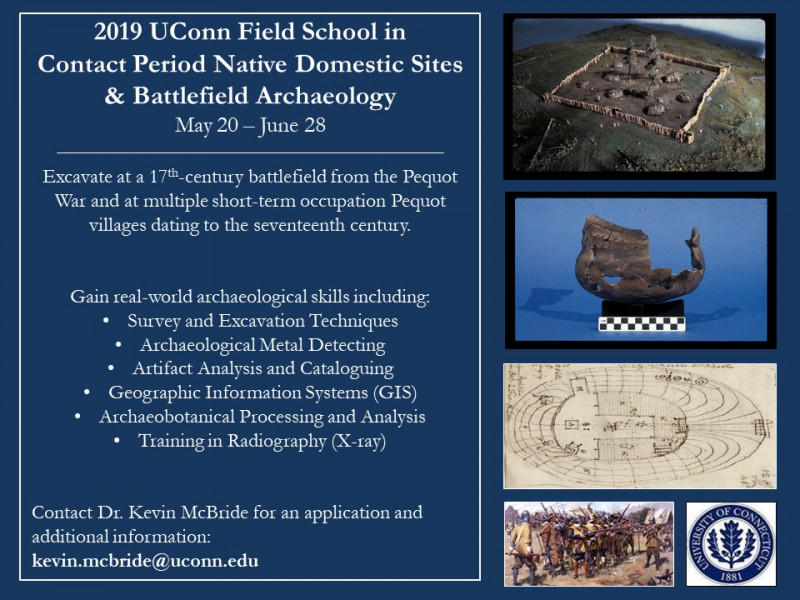Fieldwork
This listing expired on May 27, 2019. Please contact kevin.mcbride@uconn.edu for any updated information.

Location: Groton, CT, US
Season: May 20, 2019 to June 28, 2019
Application Deadline: May 10, 2019
Deadline Type: Rolling
Program Type:
Field school
RPA Certified:
no
Affiliation:
University of Connecticut Department of Anthropology
Project Director:
Dr. Kevin McBride, Associate Professor at the University of Connecticut
Project Description:
The University of Connecticut will offer a field school in Contact Period & Battlefield Archaeology focused on sites associated with the Pequot War of 1636-1637. The Battle of Mistick Fort: English Withdrawal & Pequot Counterattack took place on May 26, 1637 immediately following the English & allied Native attack on the Pequot fortified village at Mistick. Fieldwork will focus on documenting the intense fighting along the four mile route of the English withdrawal and on excavating the Calluna Hill site, a Pequot village burned by the English during their withdrawal. This domestic site has remained undisturbed since it was abandoned and provides a unique opportunity to examine Pequot domestic architecture and space, foodways, and material culture. The battlefield project is funded by grants from the National Park Service American Battlefield Protection Program and is part of a long-term effort to document the Battlefields of the Pequot War.
The 2019 UConn field school will be based at the UConn Storrs campus with fieldwork taking place at Mystic (Groton), Connecticut. The 6-week, 6-credit field school will include training in standard archaeological field survey and excavation, artifact conservation, cataloguing, identification and analysis of 17th Century material culture, archaeobotany, radiography (X-ray), and analysis of primary sources. Training will also be provided in research and field methods specific to battlefield archaeology including use of military terrain models, metal detecting survey, and GPS/GIS applications. The field school provides a unique opportunity for students to work on a nationally significant collaborative research project alongside tribal members, archaeologists and military historians. In addition to the fieldwork, students will participate in training workshops in laboratory and research methods, attend guest lectures, complete assigned readings and maintain a daily field journal.
Period(s) of Occupation: Seventeenth Century
Project Size: 1-24 participants
Minimum Age: 18
Experience Required: None
Room and Board Arrangements:
University housing and meal plans are available as well as some other options. Contact Res Life at 860-486-2926 for a summer housing application or go to this website to learn more: http://www.reslife.uconn.edu/ Cost:
Academic Credit:
6 credits offered by University of Connecticut. Tuition is Summer Session courses are paid on a per-credit basis at a rate of $536 per credit hour. If you choose the full six-week program, your cost will be $3,216. In addition, there is a $75 lab fee, payable on the first day of class..
Kevin McBride
354 Mansfield Road, Unit 1176, Beach Hall
Storrs
CT
6269
The AIA is North America's largest and oldest nonprofit organization dedicated to archaeology. The Institute advances awareness, education, fieldwork, preservation, publication, and research of archaeological sites and cultural heritage throughout the world. Your contribution makes a difference.
Notifications